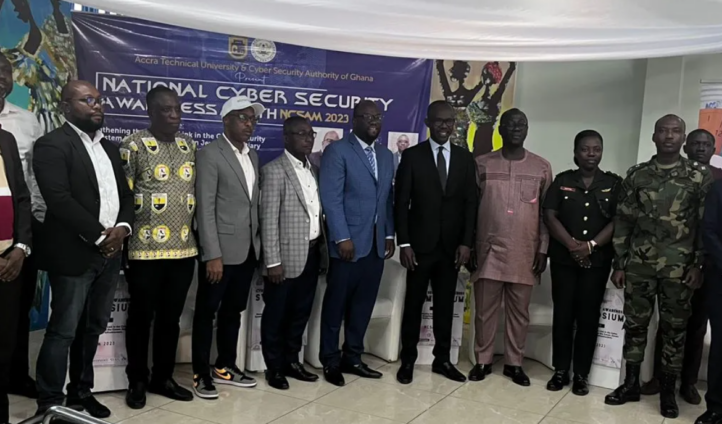The Director-General of Cyber Security Authority, has urged the public, especially institutions, to take responsibility for their cybersecurity by investing in antivirus.
This, Dr Albert Antwi-Boasiako, explained, could be one of the surest ways to protect sensitive data from malicious programmes.
Dr Antwi-Boasiako who was speaking at a cybersecurity awareness symposium organized by the Accra Technical University (ATU), said the advancement of the cyber space exposed individuals and organisations to greater risk.
The event was part of the School’s activities to mark this year’s cybersecurity awareness month campaign, celebrated globally to remind people of the need to protect themselves, family, and business from online threats.
Their local theme was “Strengthening the weakest link in the Cyber Security Ecosystem to protect the crown jewels of tertiary education infrastructure.”
Dr Antwi-Boasiako said the weakest link in the space of cyber security was human beings’ ability to minimally safeguard their private information.
He advised organisations, especially educational institutions, to take adequate steps to protect sensitive information, including examination results, financial payments, and students data.
“It is not enough to invest in technologies to protect sensitive information, but it is important to build the capacity of the people to man the systems,” he said.
Professor Amavi Acakpovi, the Acting Vice-Chancellor of ATU, said the emergence of COVID-19, and the rise in the use of the internet for many activities, including e-campus, conducting examinations, and meetings heightened the need for cybersecurity.
“Today we run many information technology systems in the University, such as academic records management, human resource records, financial records, admission and certification,” he said.
The University, Prof Acakpovi said, was at the forefront of technological education, and had taken steps to be a beacon of knowledge and innovation.
“We recognise that, in the 21st century, our students, faculty, and the community at large must be well-versed in the art of cyber defence,” he said.
He said the future of the country’s digital society, the security of sensitive information, and the protection of critical infrastructure depended on collective efforts.
Prof Acakpovi said the School had invested in innovative technology, established state-of-the-art cybersecurity programmes, and forged collaborations with industry experts and government agencies to strengthen its defences.
He said, “The threats we face today may pale in comparison to those of tomorrow, hence, the need for continuous dialogue, the dissemination of knowledge, the exploration of emerging trends, and the sharing of best practices are not just a necessity; it is our moral and ethical obligation to future generations.”
Latest Stories
-
Paris 2024: Opening ceremony showcases grandiose celebration of French culture and diversity
3 hours -
How decline of Indian vultures led to 500,000 human deaths
4 hours -
Paris 2024: Ghana rocks ‘fabulous fugu’ at olympics opening ceremony
4 hours -
Trust Hospital faces financial strain with rising debt levels – Auditor-General’s report
4 hours -
Electrochem lease: Allocate portions of land to Songor people – Resident demand
5 hours -
82 widows receive financial aid from Chayil Foundation
5 hours -
The silent struggles: Female journalists grapple with Ghana’s high cost of living
5 hours -
BoG yet to make any payment to Service Ghana Auto Group
5 hours -
‘Crushed Young’: The Multimedia Group, JL Properties surprise accident victim’s family with fully-furnished apartment
6 hours -
Asante Kotoko needs structure that would outlive any administration – Opoku Nti
6 hours -
JoyNews exposé on Customs officials demanding bribes airs on July 29
6 hours -
JoyNews Impact Maker Awardee ships first consignment of honey from Kwahu Afram Plains
8 hours -
Joint committee under fire over report on salt mining lease granted Electrochem
8 hours -
Life Lounge with Edem Knight-Tay: Don’t be beaten the third time
8 hours -
Pro-NPP group launched to help ‘Break the 8’
8 hours

